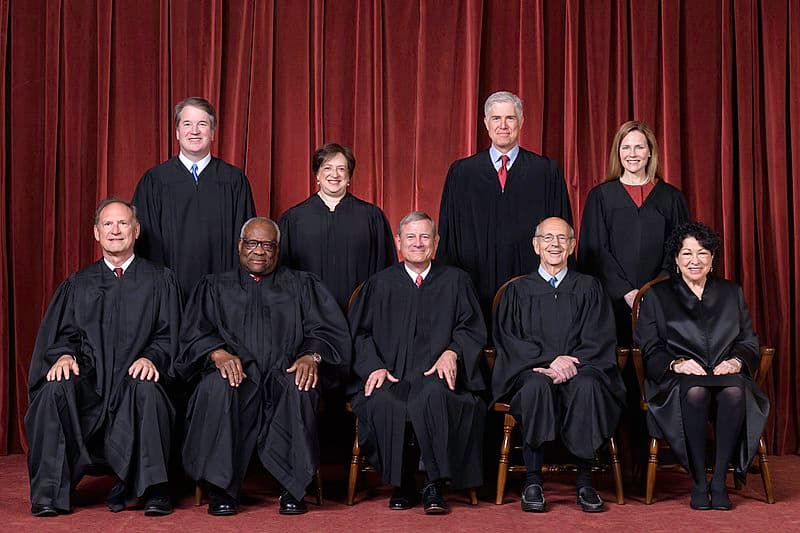The Scoop on Roe v. Wade
After nearly 50 years of increasingly bitter wrangling among Americans, the sages appear to be on the brink of handing the power to regulate or even ban abortion back to the states and to the people.

What is reported to be the first draft of a Supreme Court opinion overturning Roe v. Wade would suggest that the justices are prepared to admit bitter failure in adjudicating the question of abortion in the United States. Instead, after nearly 50 years of increasingly fierce wrangling among Americans, the sages appear to be on the brink of handing the power to regulate or even ban abortion back to the states and to the people.
That the draft is being circulated among the justices was first reported by one of America’s most credible reporters, Josh Gerstein of Politico. He unfurled a draft opinion of the Court by Justice Samuel Alito that Politico called “a full-throated, unflinching repudiation of the 1973 decision which guaranteed federal constitutional protections of abortion rights and a subsequent 1992 decision — Planned Parenthood v. Casey.”
“Roe was egregiously wrong from the start,” Justice Alito writes in the first draft opinion, according to Politico’s report. At one point the purported Alito draft declares: “We hold that Roe and Casey must be overruled.” It goes on to note that Roe’s “reasoning was exceptionally weak,” and that the Constitution “makes no reference to abortion, and no such right is implicitly protected by any constitutional provision.”
That includes, the Alito draft says, the constitutional provision known as the Due Process Clause of the Fourteenth Amendment. It is the Due Process Clause on which defenders of Roe and a later abortion precedent known as Casey chiefly rely, the draft says. Justice Alito is quoted writing that the Due Process Clause “has been held to guarantee some rights that are not mentioned in the Constitution.”
Roe v. Wade itself was handed down in 1973. It was promptly met with a chorus of error, epitomized by a New York Times editorial that said “[t]he Court’s seven‐to‐two ruling could bring to an end the emotional and divisive public argument over what always should have been an intensely private and personal matter.” Instead, it opened two full generations of bitter protest by religious Americans and conservative states.
It was the effort of one of those states — Mississippi — to enact curbs on abortion that precipitated the case in which Justice Alito purportedly wrote the opinion leaked this evening, Dobbs v. Jackson Women’s Health Organization. It is important to note, as Politico did, that the opinion laid to Justice Alito was circulated back in February. It could well be that the first draft opinion, if genuine, was overtaken by other, different drafts.
If so, it certainly wouldn’t be the first time that opinion within the court shifted during the course of reaching a decision. The Nine was deeply divided over the separate-but-equal school doctrine, and some of those opposed to separation felt the court had no power to end it. Yet in the end, partly because of leadership by Chief Justice Earl Warren, the disagreements were resolved and Brown v. Board of Education was unanimous.
That appears unlikely in Dobbs, even if the Alito draft ends up relatively intact. Senator Sanders is already plumping for national legislation in which the Congress would enact the kind of abortion rights that the Alito draft just leaked suggest were wrongly espied within the Constitution. The editor of the National Review, Rich Lowry, has called for the conservative justices on the court to be given bodyguards.
Plus, too, the hunt for the leaker will commence, along with a debate over motives. Was the leak intended to pre-empt a ruling overturning Roe? Or to pre-empt an effort to pre-empt a ruling overturning Roe? Good luck finding out from Mr. Gerstein, one of the least talkative, most principled reporters we’ve ever encountered (Mr. Gerstein spent several years on the print edition of the Sun, much of it covering major court cases).
As for the substance of Roe, we’ve long since concluded that the case was wrongly decided and deserves to be overturned. In the long run, we believe, Roe will be a learning experience for our nation — a cautionary tale on the power of the courts to deal with our most difficult social issues. The far better institutions are our legislatures, with their responsiveness to the people who ordained our Constitution in the first place.

